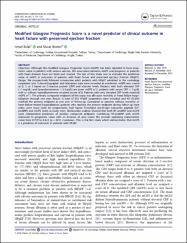| dc.contributor.author | Bolat, Ismail | |
| dc.contributor.author | Biteker, Murat | |
| dc.date.accessioned | 2020-11-20T14:39:56Z | |
| dc.date.available | 2020-11-20T14:39:56Z | |
| dc.date.issued | 2020 | |
| dc.identifier.issn | 1401-7431 | |
| dc.identifier.issn | 1651-2006 | |
| dc.identifier.uri | https://doi.org/10.1080/14017431.2019.1709656 | |
| dc.identifier.uri | https://hdl.handle.net/20.500.12809/620 | |
| dc.description | WOS: 000508765000001 | en_US |
| dc.description | PubMed ID: 31965867 | en_US |
| dc.description.abstract | Objectives. Although the modified Glasgow Prognostic Score (mGPS) has been reported to have prognostic value in patients with various cancers, the association between mGPS and prognosis in patients with heart diseases have not been well studied. The aim of this study was to evaluate the predictive value of mGPS in outcomes of patients with heart failure and preserved ejection fraction (HFpEF). Design. We prospectively followed consecutive adult patients with HFpEF admitted to the cardiology outpatient unit. Echocardiographic and laboratory data were recorded at enrolment. mGPS was scored as 0, 1, or 2 based on C-reactive protein (CRP) and albumin levels. Patients with both elevated CRP (>1 mg/dL) and hypoalbuminemia (<3.5 g/dL) are given mGPS of 2, patients with serum CRP <= 1 g/dL with or without hypoalbuminemia received scores of 0. Patients with only elevated CRP levels received mGPS of 1. The primary composite endpoint of the study was all-cause mortality or heart failure hospitalization through one year. Results. A total of 315 HFpEF outpatients were included, and 42 (13.3%) reached the primary endpoint at one year of follow-up. Compared to patients without mortality or heart failure-related hospitalization, patients who reached the primary endpoint during follow-up were older, were more likely be symptomatic, had higher N-terminal pro-B-type natriuretic peptide (NT-proBNP) and mGPS levels at study entry. Multivariate analysis showed that both NT-proBNP and mGPS were independent predictors of primary composite endpoint. Combining NT-proBNP with mGPS improved its prognostic value with an increase of area under the receiver operating characteristic curve from 0.759 to 0.822 (p = .001). Conclusion. This is the first study which demonstrates that mGPS is a predictor of outcomes in patients with HFpEF. | en_US |
| dc.item-language.iso | eng | en_US |
| dc.publisher | Taylor & Francis Ltd | en_US |
| dc.item-rights | info:eu-repo/semantics/openAccess | en_US |
| dc.subject | Heart Failure With Preserved Ejection Fraction | en_US |
| dc.subject | Modified Glasgow Prognostic Score | en_US |
| dc.subject | All-Cause Mortality | en_US |
| dc.subject | Hospitalization | en_US |
| dc.title | Modified Glasgow Prognostic Score is a novel predictor of clinical outcome in heart failure with preserved ejection fraction | en_US |
| dc.item-type | article | en_US |
| dc.contributor.department | MÜ, Tıp Fakültesi, Dahili Tıp Bilimleri Bölümü | en_US |
| dc.contributor.institutionauthor | Biteker, Murat | |
| dc.identifier.doi | 10.1080/14017431.2019.1709656 | |
| dc.identifier.volume | 54 | en_US |
| dc.identifier.issue | 3 | en_US |
| dc.identifier.startpage | 174 | en_US |
| dc.identifier.endpage | 178 | en_US |
| dc.relation.journal | Scandinavian Cardiovascular Journal | en_US |
| dc.relation.publicationcategory | Makale - Uluslararası Hakemli Dergi - Kurum Öğretim Elemanı | en_US |


















